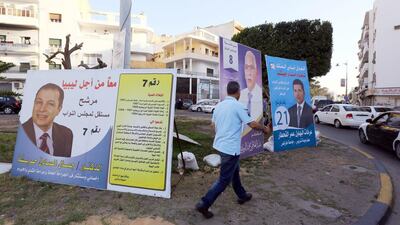BANI WALID // Damaged ancient columns, smashed glass display cases and a visitors book from 1999 are pretty much what’s left from the historic museum in the Libyan city of Bani Walid.
Once a European tourist destination, the museum was occupied by militia fighters from different cities who smeared slogans on its walls when they seized the former bastion of Muammar Qaddafi during heavy fighting in 2011 and 2012.
“There is no excuse to destroy a museum. It is difficult to forget it,” said Abdel Nasser Al Rabasi, a civil servant and candidate for parliament when Libya goes to polls on Wednesday.
Officials and diplomats hope the North African country’s second vote since the removal of Qaddafi will help ease political tensions and chaos gripping the major oil producer.
Libya badly needs a functioning parliament and government to impose authority on a country dominated by rival militias, armed tribesmen and Islamists who helped topple Qaddafi but now defy state authority.
But the story of Bani Walid shows the challenge Libya’s new rulers face in reconciling groups and regions with long-running enmities, while embracing the losers of the revolt.
Long a bastion of Qaddafi, Bani Walid — on a rocky perch 170 kilometre south of Tripoli — held out two months longer than the capital before rebels finally took it. Qaddafi’s son Saif Al Islam made a last stand here before vanishing into the desert.
Fighting did not end even after the Nato-backed uprising. Militiamen from western cities such as Misurata came back in October 2012 in a government-approved attack after Bani Walid failed to hand over men who had kidnapped and tortured Omar Shaaban, a rebel fighter who caught Qaddafi hiding in a drain. Shaaban had died of his wounds.
Residents have rebuilt the heavily shelled university buildings and repainted most houses, but the scars of war can still be seen in bullet-ridden walls in the city centre.
Forgetting the fighting — during which residents say many houses were looted by militiamen — will take time.
“Bani Walid is a struggling society because of the movement of change. Therefore mentally they don’t believe in slogans like democracy,” said Abdallah Belkhir, a lawmaker who is running again. A failure by Tripoli to improve state services — a complaint heard all over Libya — was fuelling dissent, he said.
Like many in Bani Walid he avoids using the word “revolution”, common in Libya to describe the 2011 uprising, calling it instead “movement of change”. Others here call the uprising “the first war”, in contrast to “the second war” — the fighting in 2012 which killed dozens and wounded hundreds.
Some residents are bitter that militiamen from other cities wrote slogans on the walls such as “national campaign” to take the city. “How can they call this a national campaign?” said Mr Al Rabasi, who said he sat long in jail under Qaddafi.
“This was for the first time a government-approved attack in Libya,” he said, standing in the deserted museum. His election campaign’s slogan is: “Don’t worry about Libya because Bani Walid is part of it.”
Western powers worry that conflicts between militias and tribes will push the major oil producer deeper into turmoil as its nascent army, still in training, is no match for fighters hardened during the eight-month uprising.
Many in Bani Walid complain the rest of the North African nation frames them as the “bad guys” because Qaddafi used to recruit members of the Warfalli tribe which dominates the city.
“It’s not true that Bani Walid supported the previous regime,” said Idris Emhemed, engineer at the faculty of electronic technology. “We want to leave the past behind us. After all we are all Libyans.”
When asked whether the fighting in 2012 still hurts he said over lunch in the faculty canteen: “It’s not easy to forget.”
The enmities date back to before the revolution. Bani Walid, a Bedouin settlement, has long been at odds with urban coastal communities such as Misurata, where the Muslim Brotherhood movement is strong.
The mutual hostility deepened during the 2011 civil war when Misurata was shelled for weeks by Qaddafi forces.
While both cities dislike each other, they are united in opposition to a federalist movement vying for regional autonomy in the east, controlled by a different set of tribes.
At Bani Walid’s university, female graduates have produced a film about the city’s history, hoping to improve its image.
“We want to showcase the history of Bani Walid which many people don’t know,” said one of the students during their graduation ceremony. They had enrolled during the revolution but classes were interrupted several times due to the violence.
Their Indian professor said her students were talented but some suffered from psychological problems from the fighting.
“I had a good student who suddenly stropped writing during the exams,” she said. “She just couldn’t write anymore.”
* Reuters

